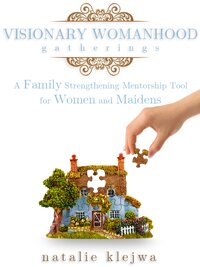
By Contributing Writer, Chelsey Hall
Today, I am continuing our 2 part series on why we’ve chosen to homeschool.
Sheltering
Sheltering. This is a nasty word for some! It carries around a lot of negativity for some reason. For us, this is just another advantage of homeschooling! (I have eluded to this somewhat in a previous post). What exactly does it mean to shelter a child?
Sheltering is safeguarding our children from adverse influences while steering them towards the positive (Maxwell, 2004).
Sheltering is not seclusion. We all shelter to some degree. When it comes right down to it, most parents believe in sheltering; it just comes down to what extent they shelter. Most parents will protect and guard their children from those things that they believe will cause their children harm.
Think about it this way: no sane parent would leave a child alone with a loaded gun. No responsible parent would allow his young child to watch pornography. When we become parents we take on the responsibility of protecting and safeguarding our children. Homeschooling, then, gives the advantage of being able to closely evaluate influences that come into our children’s lives. Furthermore, external pressures may reinforce behavior to a point beyond the child’s current level of self-control (Maxwell, 2004).
What, then, are the outside influences that a parent would want to shelter their children from?
Schools have a tendency to label a child with Attention Deficit Disorder (ADD) or Learning Disabled (LD). Reports have shown that over 2.6 million children between the ages of 6-11 have been diagnosed with either ADD or LD in the last several years, and the number continues to climb (Pastor & Rueben, 1997).
Furthermore, children today also face sexual pressure at much younger ages. A coordinator for a Planned Parenthood facility reported that out of every 20 seventh graders that they see, five discussed having some kind of sexual activity (Elizabeth & Carpenter, 2003).
Drug and Alcohol abuse is yet another outside influence many parents choose to shelter their children from. According to a medical review done by Healthwise, “Approximately one-half of all high school seniors in the United States admit to having used alcohol or an illegal drug.” (Youngerman-Cole, 2005, High Risk Groups, ¶1).
Therefore, the necessity does exist for parents to safeguard their children from harm. Sheltering is much like a sheepfold, and should be an environment of safety and protection, where the wolves are kept out (Maxwell, 2004). Children are not prepared to withstand the influences that surround them. Homeschooling, though, allows for this sheltered environment to be fostered and nurtured.
Socialization
Ah, the socialization question. Am I “socially killing” my children by not putting them in school? Ten years ago it was an unequivocal yes! However, the Lord has been so gracious and patient showing me otherwise! The whole idea of “lack of socialization” is a misnomer. People tend to confuse socialization with having a social life.
Socialization is learning how to behave and apply social skills appropriately in all situations. In the Blackwell Encyclopedia of Social Psychology, socialization is defined as, “…the process whereby people acquire the rules of behavior and systems of beliefs and attitudes that equip a person to function effectively as a member of society” (Socialization, 1995).
Many would argue that children need to be around their peers to learn these behavior rules; however peer-to peer socialization is over-rated. Whereas in the school system children are constantly being compared to one another, homeschooling drastically reduces this and allows for self-focus and awareness.
I love what John Holt, one of the early advocates of homeschooling, said:
If I could give just one reason why children should NOT go to public schools, it would be the socialization they receive there. In general, the kind of behavior one finds most often in schools is petty, cruel, and mean-spirited.
Is this the kind of socialization we want for our children? Keep in mind Dan, my husband, is a schoolteacher and can attest that this is the “norm” in the schools. Though there are good and wonderful children in the public school and private school systems, the bad can, and does most often, out-weigh the good!
Where then, would a child learn the rules of behavior, if not from peers? In an article on the myths of homeschooling, Michael Romanowski explores just this question:
Schools are not the only place that children can learn these basic life skills. Nelson argues that ‘home schooled children are more frequently exposed to a wider variety of people and situation that could be expected in a traditional classroom environment where their exposure is limited to twenty-five to thirty-five people of similar age and socioeconomic background’ (1998,35)…From research findings, Galloway (as cited in Medlin 2000) concludes that because homeschooled students are not peer-grouped in school, they learn to get along with a variety of people, making them socially mature and able to adjust to new situations.. (2006, Myth #1, ¶5)
Clearly, the right homeschooling environment can foster productive and lifelong learning habits. Furthermore, with all the many outlets that homeschooling affords, socialization need not be an issue for a parent to contemplate. I can honestly say that after 7 years into this, I don’t think twice about socialization; it’s not even an issue in our home.
Family
How often do we hear folks say, “my children have grown up so fast,” or, “looking back, I wish I had spent more time playing with my children”?
I get to spend all day with my children. I know for some, it might seem overwhelming. There are days that I wish I could be doing anything but grading a math paper, but then I remember that this is my job and my calling. I remember that I get to be the one that influences and teaches my child. This is something I wouldn’t trade for the world.
By homeschooling, we get to set our own schedule. I don’t have to work on anyone’s time frame but my own. If we want to take a day off, or a week off, or even a month off, we can do it. This was especially helpful when I was taking care of my mom while she was battling cancer and then after she passed away and we needed time to grieve, and again, when my best friend was in the hospital and died, we were able to take the time we needed then as well. It allows for such flexibility.
We can take family vacations anytime we want without having to worry about pulling them out of school to do it. We have the freedom, too, to go on field trips anytime we want without fighting the crowds or traffic. These may seem like small and insignificant reasons, but having the freedom to do what I want, when I want with my kids is huge for me!
Our children have also become one another’s best friends. My oldest enjoys playing with the younger children and vice-versa. It is wonderful to see them enjoying one another’s company. It is fostering close relationships that will last a lifetime.
Spiritual
Most of what the Lord has shown to us and revealed to our family has been in the spiritual realm of reasoning. I love the Scripture in Deuteronomy 6:7-9 that says:
And these words which I command you today shall be in your heart. You shall teach them diligently to your children, and shall talk of them when you sit in your house, when you walk by the way, when you lie down, and when you rise up. You shall bind them as a sign on your hand, and they shall be as frontlets between your eyes. You shall write them on the doorposts of your house and on your gates.
By homeschooling, we allow the Lord to fully be in charge of what we are teaching our children. Each semester I spend time in prayer seeking the Lord’s wisdom and direction in what we should use for curriculum and what/how we should be teaching our children. We make sure to choose curriculum that is Christ centered and Biblically focused.
Even more than what they are learning, the Lord has convicted me that I should be more concerned with their holiness. I often tell my children that, “I am more concerned with your holiness than your happiness!” Having my children at home with me gives me the opportunity to train them in the Word and prepare their hearts and minds for whatever the Lord calls them to do when they are grown.
In Conclusion
I’m sure I could sit here and list 100 more reasons that we have felt led to homeschool, but I have hit on the main reasons in this series. Many people have questioned my strong convictions to homeschooling. Do I believe homeschooling is the best way for a Christian family to educate their children? Yes, I do.
And I’ll take that a step further. For our family, homeschooling is a matter of obedience to the Lord, not just what we “feel” is best. Now, I do NOT judge or think ill of my brothers and sisters in Christ who decide to public school or private school their children. It is a decision that each family must make for themselves.
My prayer is that families would take the time to seek the Father and the Scriptures in this matter, and then follow the leading and the prompting of the Lord. While seeking direction and wisdom be truly open to the leading and prompting of the Spirit. Ask God, listen, and then do what, or go where, He leads!
References:
Maxwell, Steve. (2004). Keeping our children’s hearts, Leavenworth: Communication Concepts.
Pastor, P. N., & Reuben, C. A. (1997). Attention deficit disorder and learning disability. Vital and Health Statistics, 10(206), 6, Retrieved March 1, 2007 from Thompson Gale PowerSearch Database.
Elizabeth, J., & Carpenter, M. (2003, September 14). More kids are having sex, and they’re having it younger. Post-Gazette, Retrieved March 1, 2007, from http://www.post- gazette.com/lifestyle/20030914teensexlifestyle1p1.asp.
Youngerman-Cole, S. (2005, April 27). Alcohol and Drug Problems. Retrieved February 27, 2007, from Peace Health Web site: http://www.peacehealth.org/kbase/topic/symptom/alcpb/overview.htm
Manstead, A.. (Ed.). (1995). Socialization (1st ed., Vol. 6, 14-18). Cambridge: Blackwell Publishing.
Romanowski, M. H. (2006, January – February). Revisiting the common myths about homeschooling. The Clearing House, 5(79), 125.
Retrieved February 8, 2007, from Academic OneFile.







Hi Chelsey, Thanks so much for the last 2 articles!! We are in our first year of homeschooling and sometimes I still wonder if it is the right thing. Friends and Family ask why and what about socialization, etc. You have answered some questions for me. With each blog I read about homeschooling I’m more convinced we are doing the right thing!! Thanks again for the encourageing words!